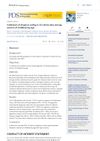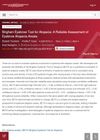 36 citations,
October 2016 in “Bone”
36 citations,
October 2016 in “Bone” A male with aromatase deficiency improved bone health with estradiol treatment.
 November 2019 in “Harper's Textbook of Pediatric Dermatology”
November 2019 in “Harper's Textbook of Pediatric Dermatology” The document is a detailed medical reference on skin and genetic disorders.
 January 2023 in “DIGITAL HEALTH”
January 2023 in “DIGITAL HEALTH” Most men using teledermatology for hair loss treatment saw improved hair and self-esteem, with some experiencing side effects.
1 citations,
January 2022 in “Journal of The American Academy of Dermatology” Direct-to-consumer teledermatology platforms have financial conflicts of interest and lack proper patient care and follow-up.
 November 2023 in “Annales de dermatologie et de vénéréologie, FMC”
November 2023 in “Annales de dermatologie et de vénéréologie, FMC” Baricitinib effectively treats severe alopecia for up to 104 weeks.
8 citations,
April 2022 in “Urology Practice” Patients should consult urologists for evidence-based erectile dysfunction treatments.
Combining online and in-person dermatology care can improve quality and access.
October 2022 in “International Journal of Dermatology” Digital health platforms improve treatment for male pattern hair loss.
 25 citations,
November 2022 in “British journal of dermatology/British journal of dermatology, Supplement”
25 citations,
November 2022 in “British journal of dermatology/British journal of dermatology, Supplement” Baricitinib for severe alopecia areata is generally safe, with common side effects like infections and acne, and low rates of serious complications.
 November 2024 in “Journal of the European Academy of Dermatology and Venereology”
November 2024 in “Journal of the European Academy of Dermatology and Venereology” Long-term baricitinib treatment can lead to significant scalp hair regrowth in patients initially showing only eyebrow or eyelash regrowth.
 April 2024 in “Pharmacoepidemiology and drug safety (Print)”
April 2024 in “Pharmacoepidemiology and drug safety (Print)” The algorithm accurately identified alopecia in women of childbearing age using claims data.
 2 citations,
July 2022 in “Journal of The American Academy of Dermatology”
2 citations,
July 2022 in “Journal of The American Academy of Dermatology” People with alopecia who are more resilient tend to feel less stressed.
 4 citations,
November 2020 in “Journal of Investigative Dermatology Symposium Proceedings”
4 citations,
November 2020 in “Journal of Investigative Dermatology Symposium Proceedings” The Brigham Eyebrow Tool for Alopecia is a simple and reliable way to measure eyebrow hair loss.
 3 citations,
June 2023 in “Journal of dermatological treatment”
3 citations,
June 2023 in “Journal of dermatological treatment” Regrowing scalp hair improves quality of life and reduces anxiety and depression in severe alopecia areata patients.
 2 citations,
February 2019 in “bioRxiv (Cold Spring Harbor Laboratory)”
2 citations,
February 2019 in “bioRxiv (Cold Spring Harbor Laboratory)” The Asiatic lion has very low genetic diversity and unique genetic traits, highlighting the need for its conservation.
 March 2022 in “Women's health issues”
March 2022 in “Women's health issues” The conclusion is that women are heavily affected by autoimmune skin diseases, face significant challenges, and need better research, treatments, and healthcare policies.
April 2023 in “Clinical, Cosmetic and Investigational Dermatology” More people are using online platforms for hair loss treatment due to convenience and privacy.
January 2023 in “Journal of Clinical and Diagnostic Research” Microneedling with PRP is as effective and safe as minoxidil+finasteride for treating hair loss.
 3 citations,
February 2011 in “Journal of Biomedical Research/Journal of biomedical research”
3 citations,
February 2011 in “Journal of Biomedical Research/Journal of biomedical research” A new mutation in the KRT86 gene was found to cause the hair disorder monilethrix in a Han family.
 July 2024 in “Dermatology and Therapy”
July 2024 in “Dermatology and Therapy” Darker hair colors may increase the risk of alopecia areata, while lighter hair colors may decrease it.
 November 2023 in “JEADV Clinical Practice”
November 2023 in “JEADV Clinical Practice” Patients with severe alopecia areata felt better and less anxious or depressed when treated with baricitinib compared to placebo.
 June 2024 in “Dermatology and Therapy”
June 2024 in “Dermatology and Therapy” Baricitinib improves quality of life and reduces anxiety and depression in severe alopecia areata patients with hair regrowth.
















